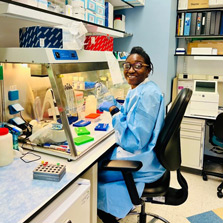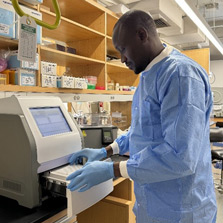APTI’s third cohort looks toward their second year
September/October 2024 | Volume 23 Number 5
The African Postdoctoral Training Initiative (APTI) is a joint effort by the African Academy of Sciences (AAS), the Bill & Melinda Gates Foundation (BMGF), and the National Institutes of Health (NIH) that aims to bolster scientific research capacity in Africa. Fellows spend two years in an NIH lab and an additional two years at their home institutions in Africa. Members of APTI’s third cohort of fellows met with AAS, BMGF, and NIH in September 2024 to present their research.
We caught up with four fellows as they reflected on the first year of their APTI journey and planned for the future.
 Photo courtesy of Gildas HounmanouDr. Gildas Hounmanou studies environmental microbiomes and disease outbreaks in Benin
Photo courtesy of Gildas HounmanouDr. Gildas Hounmanou studies environmental microbiomes and disease outbreaks in Benin
Dr. Gildas Hounmanou
“The skills and knowledge gained through APTI will be instrumental in achieving my goals”—Dr. Gildas Hounmanou
Dr. Gildas Hounmanou leads a study in Africa's largest lake village near Lake Nokoué in Benin exploring the connection between human microbiota and environmental microbiomes. His research focuses on how disease-causing microorganisms persist and spread between humans and the lake’s ecosystem. By examining environmental exposures, seasonal changes, and human activities, the study aims to uncover factors contributing to outbreaks of diseases like cholera, typhoid, and water-related skin diseases.
Through the APTI program, Hounmanou has gained advanced skills in computational biology, including metagenomics and machine learning, crucial for his goal of establishing a research program on sensitive infectious diseases in vulnerable communities. He also aims to create a sustainable, decentralized real-time sequencing and bioinformatics infrastructure in Francophone Africa, a region with a historically high disease burden.
 Photo courtesy of Vinie KouamouDr. Vinie Kouamou studies HIV drug resistance and mechanisms of HIV persistence in CD4+ T Cells in Cameroon
Photo courtesy of Vinie KouamouDr. Vinie Kouamou studies HIV drug resistance and mechanisms of HIV persistence in CD4+ T Cells in Cameroon
Dr. Vinie Kouamou
“The knowledge I’ve gained will help me make meaningful contributions to health research as an independent scientist."—Dr. Vinie Kouamou
Dr. Vinie Kouamou credits her interest in HIV research to her late mother who was a laboratory scientist. Kouamou holds a PhD in Clinical Virology from the University of Zimbabwe and has received numerous awards throughout her career. As part of her APTI project with the National Institutes of Allergy and Infectious Diseases (NIAID), she is investigating how defective HIV-1 proviruses, a form of a virus that is integrated into the genetic material of a host cell but is unable to produce an intact virus, continue to trigger immune responses. This can lead to chronic inflammation among people living with HIV that are on antiretroviral therapy (ART), even though ART suppresses the immune system. She is researching how we can use these defectives HIV-1 proviruses as a barcode to track the CD4+ T cell subsets in humans to better understand HIV latency and develop more effective cures.
Through the APTI program, Kouamou has learned advanced scientific concepts and methodologies in virology, immunology, and vaccinology, skills vital for her preparation for pursuing independent research in the future. She plans to conduct independent research that contributes to health policies in Africa.
 Photo courtesy of Carine Kunsevi-KilolaDr. Carine Kunsevi-Kilola studies HIV and malaria in Pregnancy in the Democratic Republic of the Congo
Photo courtesy of Carine Kunsevi-KilolaDr. Carine Kunsevi-Kilola studies HIV and malaria in Pregnancy in the Democratic Republic of the Congo
Dr. Carine Kunsevi-Kilola
“The APTI program provided me with a unique opportunity to enhance my research skills, expand my professional network, and contribute to groundbreaking research in Africa.”— Dr. Carine Kunsevi-Kilola
Before joining the APTI program, Dr. Carine Kunsevi-Kilola served as a postdoctoral research fellow at the Reproductive Immunology Research Consortium in Africa (RIRCA), based at Stellenbosch University, where her research focused on investigating the effects of HIV and antiretroviral therapy (ART) on pregnancy outcomes and child development.
Through the APTI program, Kunsevi-Kilola is expanding her research to explore the role of certain proteins on the surface of immune cells (called complement components) in shaping the immune responses to HIV and malaria infections during pregnancy, specifically in the plasma of malaria-infected women. In the second phase of her APTI project, she plans to extend her analysis to include both plasma and placenta tissues from women living with HIV.
She says the APTI program has equipped her with valuable technical skills like proteomics and pathway analysis, which will help her reach her ultimate goal of continuing research in reproductive immunology or related fields, focusing on topics like HIV, malaria, and pregnancy outcomes.
 Photo courtesy of Amadou NiangalyDr. Amadou Niangaly conducts molecular surveillance of malaria in Mali
Photo courtesy of Amadou NiangalyDr. Amadou Niangaly conducts molecular surveillance of malaria in Mali
Dr. Amadou Niangaly
“This program is a fortune for African scientists; it provides training, capacity building, and partnerships for groundbreaking research"—Dr. Amadou Niangaly
Dr. Amadou Niangaly started his biomedical research career in the early 2000, s, when he received a PhD in parasitology-mycology and medical entomology from the University of Bamako, Mali. He's currently an associate professor at the University of Sciences, Techniques and Technologies, also in Bamako.
During the first phase of his APTI fellowship, he has been using genomic analysis to understand how the malaria parasite adapts to vaccines, drugs, and monoclonal antibodies. So far, Niangaly has learned critical skills in next-generation sequencing and molecular surveillance, which he plans to apply to infectious disease control in Africa and ultimately establish a genomics laboratory at his institution in Mali.
In conclusion, APTI fellowships have not only advanced each fellow's career, but also benefited global health research more broadly. As of 2024, the program has not yet been renewed, but as these fellows attest, APTI continues to offer a transformative experience for African scientists, providing them with the tools and networks needed to make a significant impact on public health in Africa and beyond.
More Information
Updated: October 11, 2024
To view Adobe PDF files,
download current, free accessible plug-ins from Adobe's website.
Related World Regions / Countries